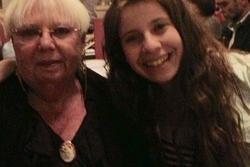My Bubbe Marches and Pickets
Sometimes a single event can define who a person is. For my grandmother Gloria Fischel, that event happened early in her life, before she even started school, yet went on to dictate the cause to which she has dedicated her adult life.
At the age of four and a half, my grandmother was diagnosed with polio. As she spent her days recovering in the children's ward, she was the only ambulatory child, and ran from bed to bed comforting others who were confined to iron lung machines. She made a full recovery and was able to walk out of the hospital, and grew up believing that G-d had intervened and enabled her to survive. Because of that, she continued to believe that she had already received G-d’s grace, and was not entitled to anything else in life. It didn’t hurt that the grandmother she loved also told her this almost every day.
Her parents had taught her the value of hard work, so that is exactly what she did. She attended Hunter College High School, where she was able to surround herself with other hard working young women. She then attended Brooklyn College, where she studied liberal arts. She originally intended on going to law school, but ended up working as a customer service representative for an engineering company through Brooklyn Polytechnic Institute. She also began volunteering at a USO club, leading craft projects for soldiers. This was her first experience working to better the lives of others, and she was hooked.
My grandmother first got involved with social activism when she joined Temple Beth Sholom in Roslyn, New York. She joined at the same time as Rabbi Joseph Sternstein, the senior Rabbi, who would go on to lead the Temple on their journey to be one of the first conservative egalitarian communities. He inspired her to go out into the world and make herself known in the world of activism. She became more involved in the political world, and began to march regularly in support of both Israel and women’s issues. She then became involved with the Women’s League for Conservative Judaism, and the Religious Coalition for Reproductive Choice. Grandma Gloria became a fixture at protests, and could always be seen wearing a hat. Soon, she received the opportunity of a lifetime; she was offered the position of an NGO, or Non-Governmental Observer, at the United Nations, where she would represent the Women’s League for Conservative Judaism.
To Gloria, the United Nations represented a unique opportunity - she would have the chance to show the world who Jews are and what they believe in. She quickly learned that the UN would be difficult - there were so few Jews in the world, and many at the UN had no idea who or what a Jew was. Gloria immediately began to educate - she sought to teach people about the Jewish faith and tradition. She always believed that Judaism was joyous, and she wanted to share that joy with everyone around her. In addition, she also sought to advocate for women’s rights – Gloria had always been a strong and independent woman, and wanted for everyone to be able to do all that she does. One of the first programs she ran at the UN featured a doctor who had treated female patients in Ethiopia with an organization called the Fistula Foundation. While it took some convincing, the program was ultimately a major success, and it was named one of the top 10 programs run by the UN that year. It established her credibility, and she was able to make even more of an impact from that point onward.
Gloria continued to produce influential programs to educate other NGOs - she ran a program about holidays with representatives from several other faiths, she developed programs on bullying, and helped to develop the United Nations Holocaust Remembrance program. Since she produced such high quality programs, she established her authority within the NGO community, and she began to be respected as an authority figure. At a United Nations conference in Paris in 2006, she noticed that someone had written on a sign that Jews were responsible for the Holocaust. She immediately took her complaints to the Under-Secretary General, who not only fixed the problem but also insisted that his staff respond to any and every complaint she had, as he respected her opinions and trusted her judgment. When the 2011 Conference on Health Issues was scheduled over Rosh Hashanah (the Jewish new year), she went to the Secretary General, who fixed the problem by rescheduling the conference, and he even bought her plane ticket.
At that conference, she had the opportunity to speak not only on behalf of Jews but on behalf of women around the globe, and she had what she considered to be her proudest moment - after giving a speech on the unseen effects of domestic violence, she was approached by a delegation of Arab women who came to hug her and thank her for shining a light on issues they faced but couldn’t speak about, and for doing it so eloquently. That moment was when Gloria felt she had really made an impact - she had been able to make a difference, and to use the incredible UN position she had earned for good. She continues to fight for the rights of women, Jews, and the State of Israel to this day - as long as she has a hat on her head, she will be unstoppable.
This piece was written as part of JWA’s Rising Voices Fellowship.







